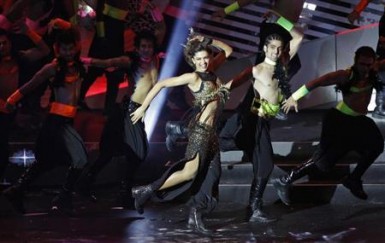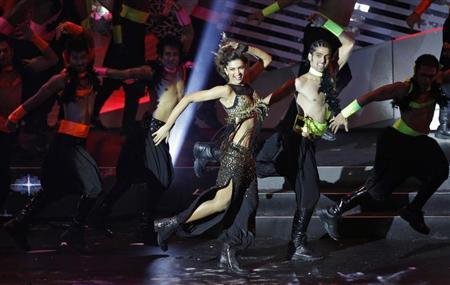MACAU (Reuters) – The film Barfi scooped top honors in India’s version of the Oscars at a ceremony in the Chinese gambling haven of Macau on Saturday that also celebrated a century of Bollywood, which makes up a big chunk of a multi-billion-dollar film industry.

Barfi is a romantic comedy about a mute and deaf man and his relationship with two women. The movie was praised by critics for its positive portrayal of physically disabled people, a somewhat unusual theme for Bollywood screenplays.
India, the world’s biggest film producer, makes more than double the number of Hollywood movies on an annual basis. Already popular in countries with sizable Indian populations, Indian films are also a growing hit with Chinese audiences as well as in Russia and Germany.
Hosted by Bollywood heartthrobs Shah Rukh Khan and Shahid Kapoor, the four-hour ceremony of pulsating dance routines and colorful costume changes was attended by an audience of over seven thousand screaming fans.
Some of Indian cinema’s biggest names including Deepika Padukone set the Macau arena alight with high octane performances, while older generation actors like Boman Irani and modern pin ups such as Vidya Balan graced the green carpet.
Known for catchy songs, whimsical backdrops and raven-tressed actresses, Bollywood films typically transport viewers away from reality to a world where good triumphs over evil and love reunites everyone, themes that resonate well in China.
“We make musicals. I think every film is a musical. Every film has at least six to seven songs,” said Ayushmann Khurrana, nominated for best actor after his debut in Vicky Donor, a romantic comedy about sperm donation. “So that is how Bollywood is completely different from Hollywood.”
Best actress was won by Vidya Balan for Kahani while Ranbir Kapoor for Barfi took home the award for best actor. Barfi also won the award for best film.
India’s film entertainment sector is booming and estimated to generate revenue of close to $5 billion by 2015.
The choice of Macau to host the annual event comes as the gambling hub is pushing to diversify its customer base beyond the traditional casino punter who spends only on the baccarat tables rather than on entertainment, dining and hospitality.
Indian customers are increasingly targeted by the casino operators due to their tendency to stay longer than the average Chinese punter and their heavy spending on non-gaming pastimes.

